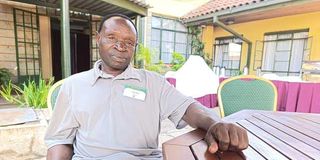
George Otieno, former Gor Mahia football club defender during an interview in Kisumu on January 24, 2025. The retired footballer claims that a number of football retirees are living in dire poverty.
They carried the Kenyan flag high during their heydays featuring for the national football team, Harambee Stars.
Their legion of fans celebrated their feat that spread the feel good aura within the population.
Their names remained common in sports conversations, but, sadly, when they eventually retired, a lonely, quiet live in the village became their new normal.
This is the sad story of several Kenyan football legends who are now wallowing in poverty.
George Otieno “Solo” is one such player. He retired to a humble live in his village Yokia in Mfangano Islands, Homa Bay.
Otieno, who played for Gor Mahia and also served as the team manager, says he has now resorted to subsistence farming to provide for his family.
This, however, is not what he expected when he kicked off his football career five decades ago.
Otieno was born in Makongeni estate, Nairobi in 1958.
“We had a local team in Makongeni where I spent my entire teenage life playing for,” Otieno recalls how it started.
“In 1975, at the age of 18, Otieno together with Mike Adede among other players joined K’Ogalo.
In 1976, Gor Mahia junior team was formed and Otieno was among the first players to be enrolled in the team.
“In 1978, I was lucky to join the Gor Mahia senior team for a friendly match in Malawi where I was to take the position of a midfielder,” says Otieno who adds that one of the team players had advised him to join the defence to take up his position since he was almost retiring.
After a good performance in Malawi, Otieno secured himself a slot in the Gor Mahia senior team as a defender. He featured for Gor until 1985.
“When I retired from football, I was invited to the club’s technical team and assumed the role of a team manager serving from 2002 to 2007,” says Otieno.
Retirement
Otieno says he retired from managing Gor in 2007 and relocated to his rural home where he used the little savings he had to start a fishing business.
Sadly, he says the fishermen he had employed were attacked two years later by Ugandan soldiers who confiscated their fishing tools leaving him without a source of revenue.
“I now farm cassava in a piece of land I inherited from my parents while taking care of my grandchildren,” says Otieno.
He claims that the meagre money he got while representing Kenya and Gor Mahia was not enough to sustain his family.
They would be rewarded Sh500 for every match won while training allowance was Sh50.
Otieno further explains that whenever they went to play out of the country, they would be awarded a daily allowance of Sh100 while winning a game would earn them an extra Sh500.
“When we lost, we would go home with nothing,” says Otieno who adds that he had to seek support from his friends to pay for his children’s school fees.
'Nothing to show'
Former Kenya international James Goro Oronge, who retired in 1985, says a number of retired footballers have nothing to show for football careers.
Goro, who hails from Siaya County, says during their hey days, they would get recognition at the community level and nationally.

Washington Mohanji, (left ) and James Goro Oronge during an interview. The two are retired footballers. While Mr Muhonji played for A.F.C Leopards and Bandari F.C,Mr Oronge played for Harambee Stars.
He says they traversed the continent in airplanes but now can hardly afford bus fares.
“A good number of us are living in dire poverty while others are either on wheelchairs or crutches with no one to turn to,” he said.
Washington Muhanji, who played for AFC Leopards and Bandari among other football clubs says that they are never recognized during local games.
He claimed that whenever they visit stadiums to watch games, they are met by ushers who fail to recognize them and demand an entry fee.
“Many times, we are turned away by the young people forgetting the glory we brought to the country when we were still actively engaged in football,” he said.
“Our neighbour Uganda honour their legendary sports people and have gone an extra mile to allocate them designated space in the stadiums during football matches. That is what we also deserve,” he said. On January 24, the legendary players assembled in Kisumu alongside other retirees for a meeting with Age Watch Africa to air their problems.
Help in planning
Age Watch Africa founder Richard Waindi says the organization works with the retired generation to ensure that they live in a way that befits their earlier experiences in life and exit life gracefully.
He says the organisation is looking forward to engaging the elderly footballers aged 60 and above whom they were meeting for the first time.
“We know that footballers have not done well in the country beyond their playing time and that is why we are here to work with them,” said Mr Waindi.
He said they planned to engage retirees in other sports.
He said the aim of the partnership is to improve the former players' living conditions financially.
The meeting brought together 20 retired footballers aged 60 and above from Western Kenya and Nyanza.
“We thought it wise to come down here and have a one-on-one interaction with the players,” he said. Waindi said that once done with the information gathering, they are hoping to come up with solutions for the players.
He said that they had earlier on had similar engagements with the footballers in Nairobi who had similar grievances.
Unlike normal employment where workers retire at age 60, Muindi said that footballers always leave the pitch at 30 to 40 years.
This he says has left many retirees battling economical and health issues.
“The moment you go off the pitch, you go into oblivion. People don't remember you. Even affording one’s daily needs becomes a challenge,” he said.






